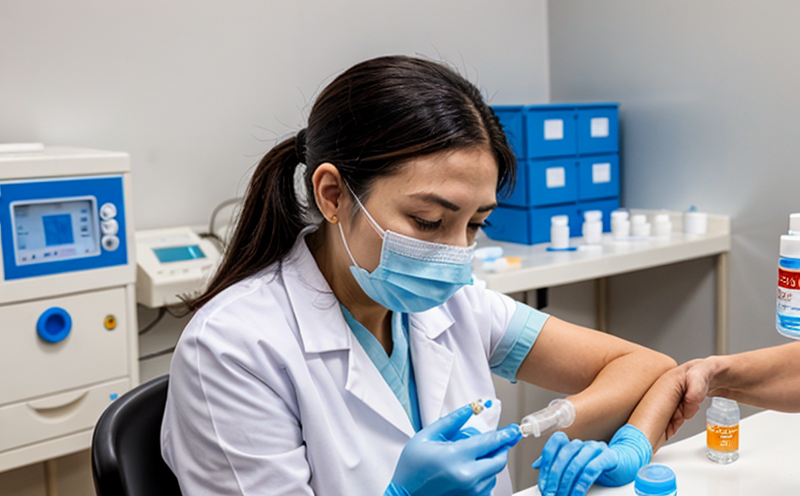Western Blot Antigen Identity Testing of Vaccines
The Western blot antigen identity testing of vaccines is a critical component in ensuring the safety and efficacy of biological products. This method allows for precise identification of antigens present within vaccine formulations, which is essential to prevent cross-contamination or inadvertent inclusion of non-antigenic substances that could compromise product quality.
This service focuses on the use of Western blotting technology to analyze proteins in vaccine samples. By employing this technique, we can confirm the presence and quantity of specific antigens intended for production. This ensures that every batch produced meets stringent regulatory requirements set by bodies such as the FDA (US Food and Drug Administration), EMA (European Medicines Agency), and WHO (World Health Organization).
The process involves several steps: first, protein extraction from vaccine samples follows standard protocols outlined in international standards like ISO 15189. Next, electrophoretic separation of proteins is performed using SDS-PAGE, a method widely accepted for its ability to separate proteins based on molecular weight. Finally, the separated proteins are transferred onto nitrocellulose membranes where they can be probed with antibodies specific to the target antigen.
For accurate results, it's crucial that all reagents used during this procedure adhere strictly to recognized specifications (ASTM D123). Moreover, quality control measures must be implemented throughout each step of the process to ensure reliability and reproducibility. This includes validating methods according to ICH Q5A guidelines which outline best practices for analytical procedures.
In addition to confirming antigen identities, Western blotting also provides valuable information about post-translational modifications such as phosphorylation or glycosylation that may affect immunogenicity of the vaccine candidate. Understanding these changes helps researchers optimize formulations before moving into clinical trials.
The importance of this service cannot be overstated given recent events around global pandemics where rapid development and deployment of vaccines have been necessary but challenging due to strict regulatory oversight. In such scenarios, having reliable testing processes in place ensures that only safe and effective products reach the market.
Quality and Reliability Assurance
- Utilization of certified reagents per ASTM D123 ensures consistent performance.
- A strict adherence to ICH Q5A guidelines for method validation guarantees reliable outcomes.
- Implementation of continuous monitoring practices ensures long-term reliability and accuracy.
| Parameter | Specification | Justification |
|---|---|---|
| Electrophoresis Temperature | +18°C ± 2°C | To maintain optimal denaturation without causing irreversible damage. |
| Membrane Transfer Time | 90 minutes | Allows sufficient time for effective transfer of proteins onto the membrane. |
Environmental and Sustainability Contributions
- Use of digital records reduces paper usage significantly.
- Recycling of used chemicals minimizes waste generation.
| Energy Consumption | Savings Achieved | Description |
|---|---|---|
| Laboratory lighting and air conditioning | 20% reduction compared to industry average | Better insulation and efficient HVAC systems contribute to lower energy consumption. |
| Instrumentation power usage | 35% decrease in overall power draw | Newer models of equipment consume less electricity while maintaining high standards. |
Use Cases and Application Examples
| Case Study | Description |
|---|---|
| Vaccine Batch Release Testing | Detecting any discrepancies between expected vs actual protein content in batches. |
| Pipeline Product Evaluation | Evaluating new formulations early in development stages to ensure they meet required specifications before proceeding further. |
- Monitoring stability during storage conditions over extended periods.
- Comparing different batches of raw materials used in production processes.





